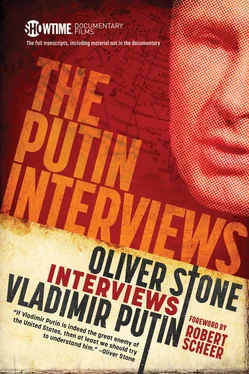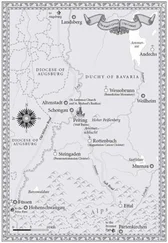OS:Perhaps this is something that Mr. Trump and Mr. Putin can really open up and it could become a gigantic success.
VP:This is just one of the issues that we’ve got to address together. It is very important and I agree with you on that one. But I’d like to reiterate, the proposal is on the table but so far our American partners have not said anything about it. This proposal was submitted to them before the active phase of the electoral campaign.
[After a break, at 11 p.m., Mr. Putin and Mr. Stone walk the corridors of the Kremlin with the interpreter.]
OS:You know this is a pretty big place you’ve got here. How do you heat it?… Don’t tell me.
VP:Yes, you should have asked something simpler. Somehow it just happens. But I can assure you that we do not use firewood to heat it.
OS:To close out the cyber warfare thing—just a few weeks ago here, in Moscow, they arrested the chief of detectives. They escorted him out of the office with a bag over his head.
VP:It was one of the hacker groups.
OS:But he was an official. An official of the government.
VP:No, no, no. He is a private person. A hacker.
OS:Three people were accused, and the rumor that I heard was that they were colluding possibly with the Americans.
VP:I don’t know about that. I know that there was a hacker group. They were perpetrating attacks against financial accounts of private persons and companies, they were taking money from people.
OS:So you think it’s a private affair. It’s not involved with this American-Russian situation?
… You ever walk down these long corridors to get exercise?
VP:No, I’ve got a small gym here.
OS:You’re never lonely at night when you walk the corridors?
VP:During the night, I don’t walk through these corridors.
OS:When I last saw you, we talked about mass surveillance. And you agreed that it didn’t make sense. It was ineffective. And since then, a new law has been passed. And I think you’ve signed it. In Russia, it’s called the Big Brother Law. [173] 173. Background Information: On June 24, 2016, Russia’s lower house of parliament voted 325 to 1 to adopt a package of amendments targeting terrorist activities and any perceived support of such activities. Human rights activists claim that the anti-terrorism measures will roll back personal freedoms and privacy. See, “Russia passes ‘Big Brother’ anti-terror laws,” Alec Luhn, The Guardian June 26 2016. Retrieved at: https://www.theguardian.com/world/2016/jun/26/russia-passes-big-brother-anti-terror-laws
And it provides exactly the kind of surveillance that you deplored about the United States method.
VP:Well, it’s not exactly like that—I’m going to tell you about it. It’s no secret, to be honest.
OS:Well, last time we talked about surveillance, mass surveillance—I had the impression you were against it and that you deplored the American technique. It was ineffective against terrorism, and as our “Snowden” movie pointed out, it was selective targeting that would work best on terrorists. And since that conversation there is a new law in Russia and you signed it. And I’m surprised. And Snowden has condemned it here in Russia. So I’m surprised. I mean, what is your feeling about this?
VP:Well, as for the law that you’ve just mentioned, this law doesn’t authorize surveillance all across the world—surveillance of people no matter who they are. It doesn’t authorize that at all. This law is about something entirely different. You mentioned Mr. Snowden. He revealed that there was surveillance performed by the NSA and the CIA of citizens all across the world, of political leaders and their allies. Whereas the law that we have adopted says that data, information has to be preserved for a longer period of time. The information should be preserved by the companies that provide internet services and telecom services. But private information, essential information, can only be obtained by special services, or by law enforcement agencies, but only if the court so decides. If there are grounds provided to the court, if the judge decides whether personal information should be provided to the law enforcement agencies or to the special services, or not. This information cannot be obtained by special services automatically from private companies. And such a law is in place in the United States, in Canada, in Australia, and in a great number of other countries. And I think that is justified and that is necessary in the fight against terrorism. Because if this data is simply deleted, then all opportunities vanish to pursue the suspects, the criminal suspects.
OS:But why? Why are you doing this? I didn’t see that there was any great terrorist threat in Russia. It seems like a dragnet on all Russian citizens.
VP:Let me say once again—the law enforcement agencies and special services can only get information if there is a decision taken by the court. This law introduces a responsibility for private companies—telecom and internet providers—to preserve data for longer. But this law doesn’t give an automatic authorization to our special services to get this kind of information. Nor should private companies provide this information to special services. Why is this law so important? Just have a look—we talked about Syria, you and I. Right now, regrettably, in Syria there are 4,500 Russian citizens aligned with Daesh, with other terrorist organizations fighting there. And another 5,000 citizens from Central Asian countries, former Soviet republics. And they’ve got connections of their own in Russia. And they prepare terrorist attacks. [174] Claim: “And they’ve got connections of their own in Russia. And they prepare terrorist attacks.” Supporting: A number of factors add up to the likelihood of future terrorist attacks in Russia. See, “Attacks on Russia Will Only Increase,” Colin P. Clarke, The Atlantic (April 4, 2017). Retrieved at: https://www.theatlantic.com/international/archive/2017/04/russia-st-petersburg-isis-syria/521766/
Last year, our special services thwarted 45 terrorist attacks. So luckily we are not seeing any serious terrorist activities, but this is not because terrorists are not fighting against us, but simply because, luckily, so far our special services have been successful in thwarting the terrorist’s activities. But Russia has been attacked by terrorists on many occasions, and people know that full well. And we have suffered very great losses and we’ve got to protect our population, our citizens.
OS:Does this have anything to do with the way Google operates, or fear or paranoia about Google, let’s say its omnipresence in Europe?
VP:I’m not sure about this paranoia. But I know that terrorists do use these channels for communication. Sometimes they use closed channels of communication.
OS:Well, I heard it was also very financially punitive for the companies that have to store the information because it costs quite a bit.
VP:This is an over-exaggeration. It’s going to be worth several trillion rubles. But to be honest, experts say that if the government thinks it all through—all the actions that need to be taken—then these costs can be reduced to one hundred billion rubles.
OS:Phew!
VP:As far as this law is concerned, when I signed it, I instructed the government to come up with a set of measures with a view to reducing the financial consequences for the companies.
Читать дальше












